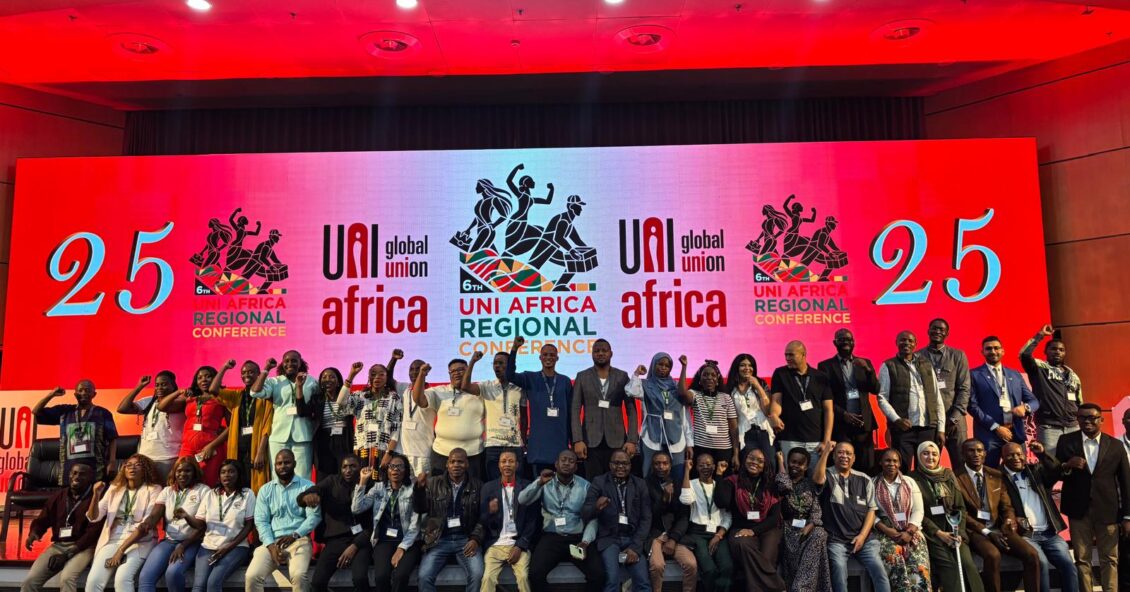UNI Africa Youth Consolidate Young Workers Power in Maputo
22.06.25
Young trade unionists from UNI Global Union affiliates across the continent gathered for the 6th UNI Africa Youth Conference on 21 June, sending a clear and united message: Africa’s youth must not only be heard, they must lead.
“Let this conference be a turning point, where ideas become action, and where young people step confidently into leadership,” said Joel Lueteta, outgoing UNI Africa Youth President from GS union in the Democratic Republic of Congo. “We’re here to learn from each other, to build power together and to make sure our voices are not only heard but lead the way forward.”
Meeting under the theme ‘Consolidating Young Workers’ Power’, participants adopted a bold action plan and elected new leadership for the next four years. With over 70 per cent of the population under 30, Africa is the youngest continent in the world. But youth continue to face systemic barriers: high rates of unemployment, exploitation, lack of training, precarious work and exclusion from decision-making processes.
Voice, representation, advocacy
Joining remotely, Marta Ochoa, UNI Global Union’s Youth Director, explained that UNI Youth’s work has been grounded in three principles: Voice – strengthening the voice of young workers; Representation – ensuring young people have a seat at the table; and Advocacy – giving young people the tools to advocate for their rights. As such UNI has implemented youth networks and mentoring programmes across Africa and youth committees play a real role in shaping UNI’s future.
UNI Africa Regional Secretary Keith Jacobs advised the group to be prepared: “As young leaders, you need to understand the challenges that undermine African workers to better confront them,” he said.
Youth mentoring was highlighted as a key strategy to build skills and confidence. Sara Amghar from UMT Morocco shared how the UNI MENA Mentoring Program helped her find her voice: “I have learned to be a good negotiator…it has helped me to be more confident, express myself more clearly and amplify the voice of young people.”
From sexual harassment prevention to leadership and workplace equality, young women leaders also emphasized the need to address gender-specific issues, which UNI refers to as the “Three Ms”: menstruation, maternity and menopause. One speaker said: “Each one of us has a voice and we need to use it. Train men and women and transform them into activists who are sensitive to women’s issues.”
Michael Adu (HSWU, Ghana) made a stark point about the systemic lack of youth presentation in Africa: “Why is the youngest continent being led by the eldest of leaders?… We are not the future of the union, we are the agents of now.”
The conference heard how young trade unionists are seeking to change this dynamic in the labour movement, with success stories from SASBO in South Africa and ASSIBIFI in Nigeria, where youth structures are shaping real union policy.
“When you give youth a chair at the table, they will build the house for your whole nation. The future of Africa is played now, and it is played with its youth,” said Mamadou Ibrahima Ndiaye from SYTS, Senegal.
The climate crisis is of particular concern to the young trade union leaders. Fatou Mourath Ndao (SNTPT, Senegal) said “Climate must be our priority. Global warming is a very serious issue and we need to reduce the danger.”
Action plan
The conference adopted a five point action plan to turn youth’s demographic advantage into union strength by embedding youth leadership and rights at the core of UNI Africa’s agenda, through:
- Strong youth structures
- Establish and activate youth committees in all affiliates.
- Create clear mandates for youth bodies to be impactful.
- Ensure enabling environments for youth engagement in union life.
- Gender equality & mentorship
- Guarantee representation of young women in youth structures.
- Support equality clauses in collective and global agreements.
- Work with women’s committees to implement mentorship and dismantle gender stereotypes.
- Representation in practice
- Ensure youth participate in sectoral, national and international activities.
- Achieve the 10 per cent youth representation target across UNI events.
- Include youth in collective bargaining teams and union delegations.
- Skill building & lifelong learning
- Develop training on unionism, workers’ rights, leadership, financial literacy and digitalization.
- Offer workshops on the impact of AI and emerging technologies on work.
- Embed training guarantees into collective agreements.
- Combatting precarious work
- Campaign for decent work, better wages and social protections for youth.
- Push governments to adopt inclusive youth employment policies and accessible labour market data.
As the conference came to a close, participants elected new leadership to steer UNI Africa Youth for the next four years. Sister Crisnalda Nhaumcale from SINECOSSE in Mozambique was voted UNI Africa Youth President. “I promise to lead with transparency and dedication,” she said. Sister Kwanele Ngubane from SASBO in South Africa and Brother Hisham Moumen from UMT in Morocco were elected as Vice-Presidents, along with a new Youth Committee.
Lebogang Keabetswe, UNI Africa Youth Coordinator concluded: “We must continue building a movement that has the necessary tools and all the protection they need. Together in solidarity we will keep rising to consolidate young workers’ power.”


